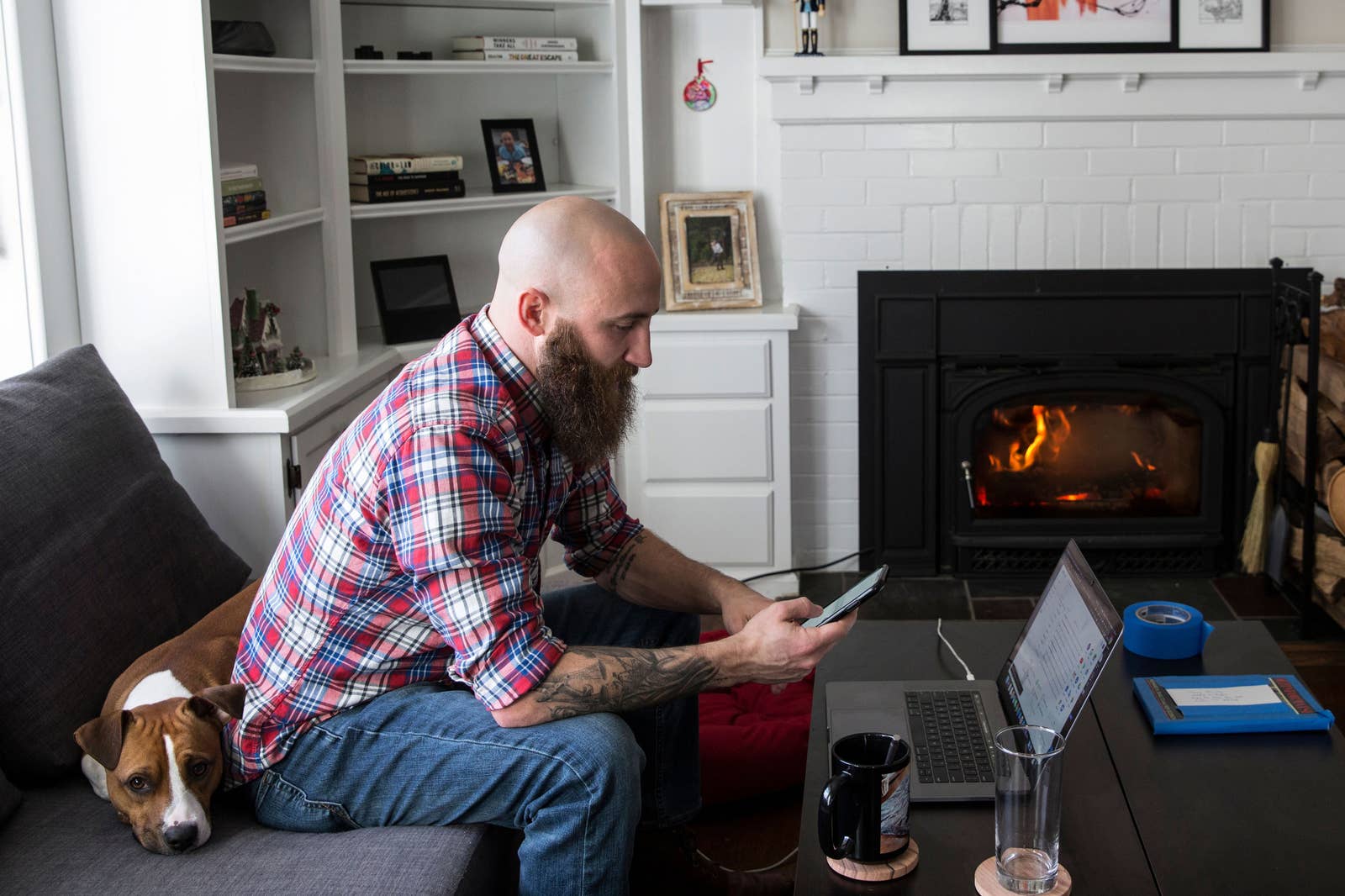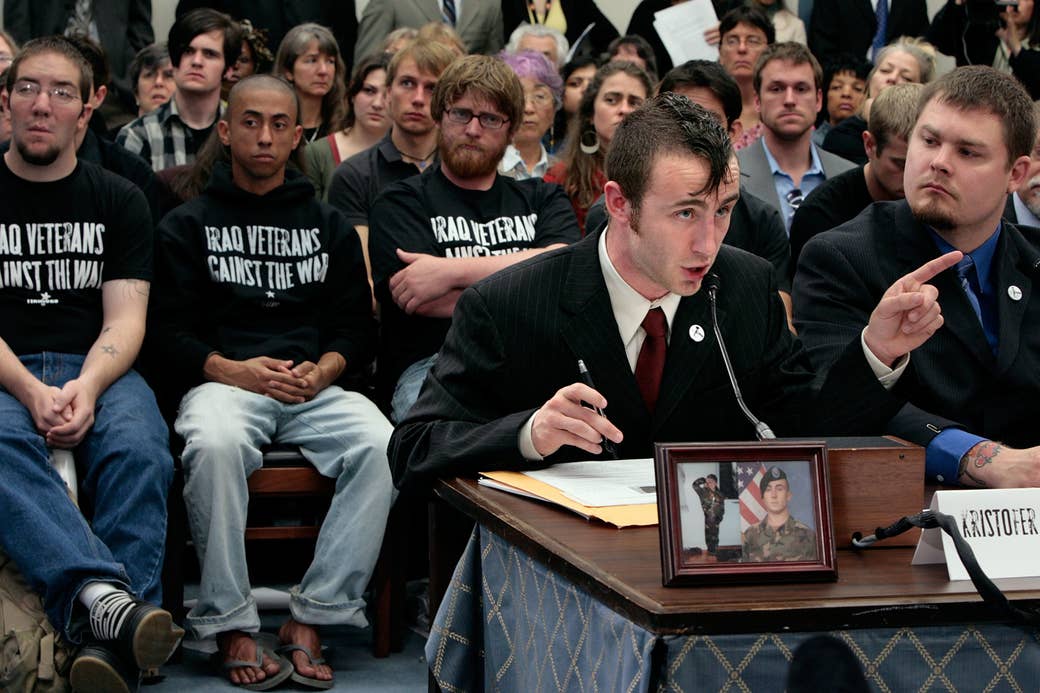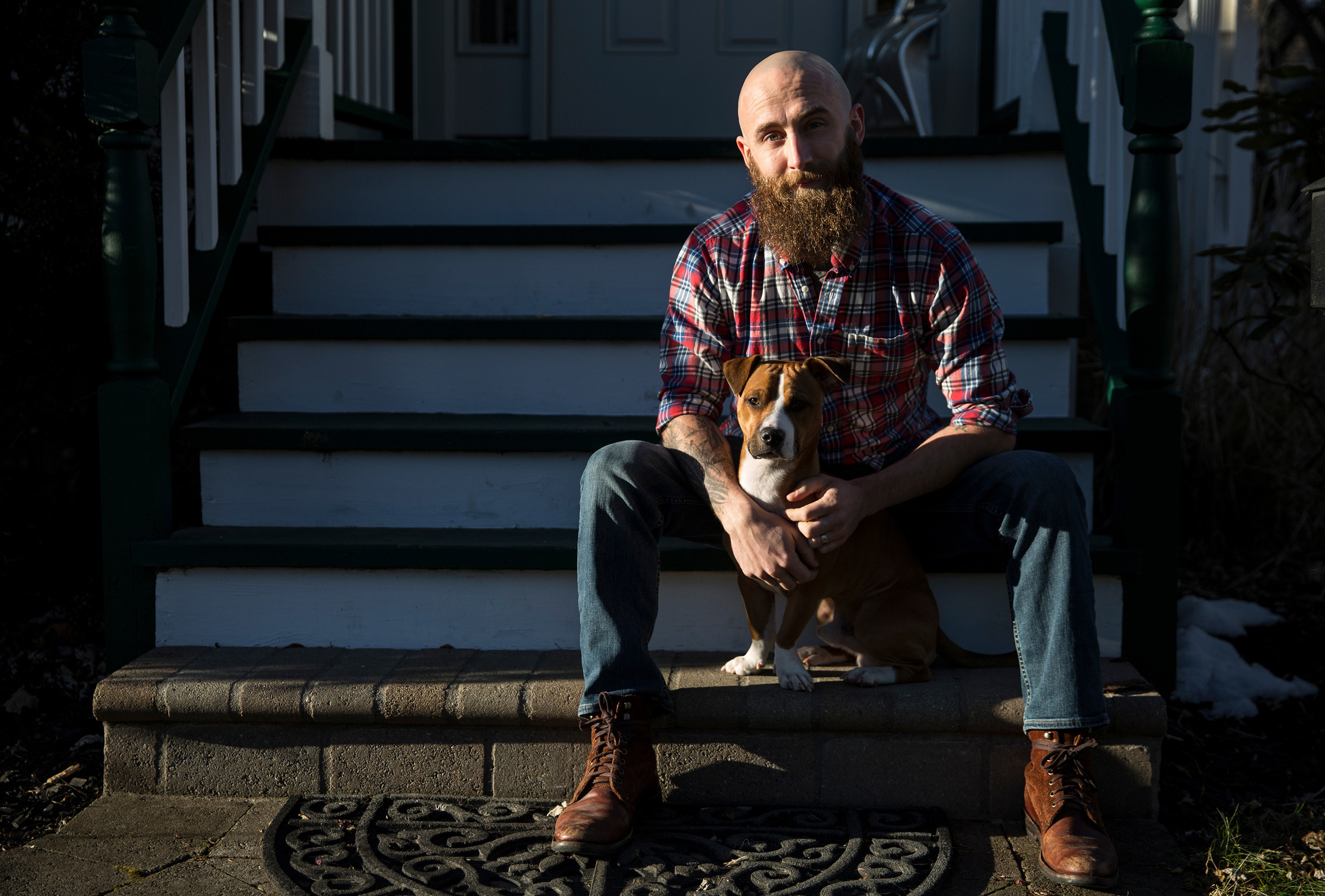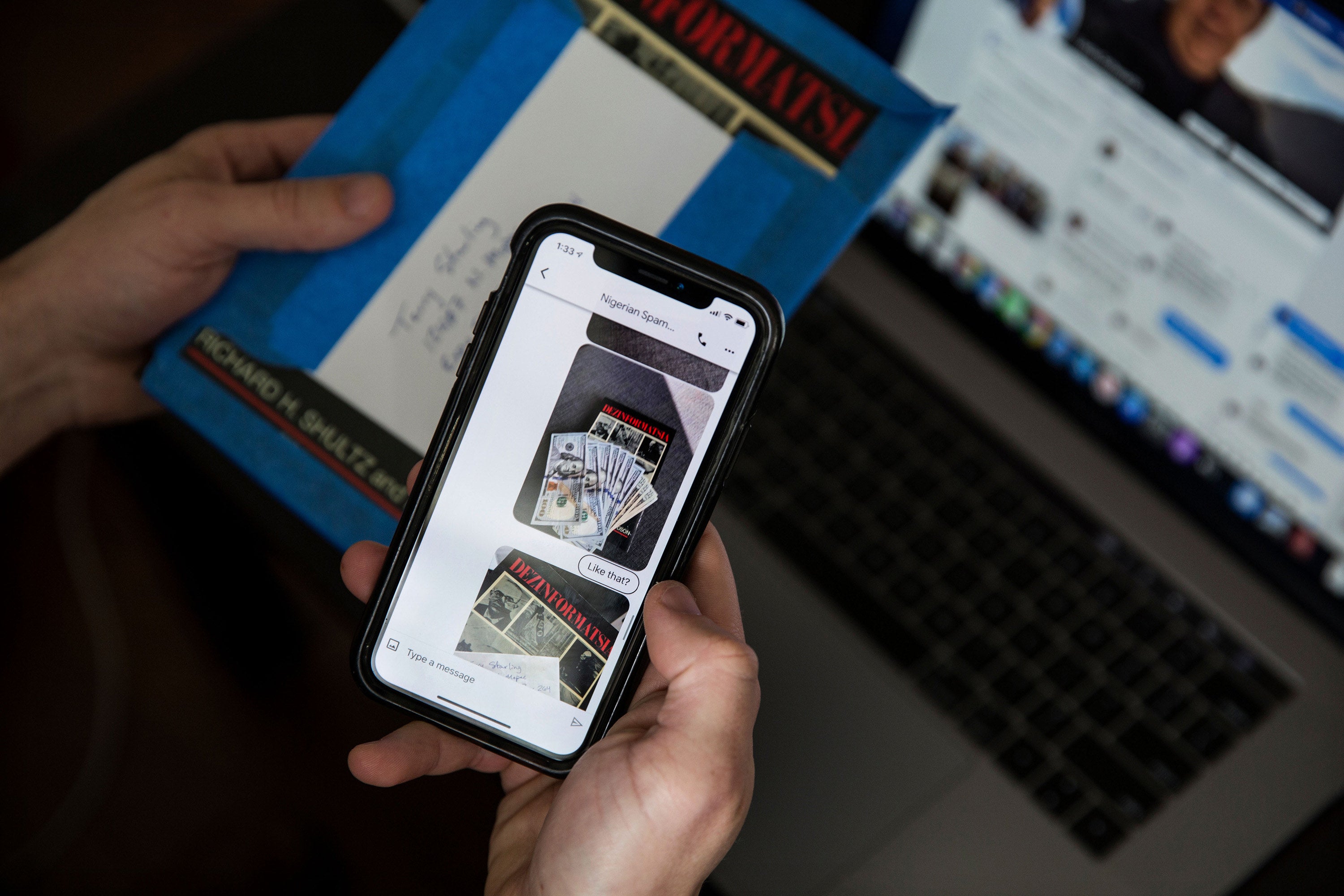
On Nov. 13, US Ambassador to Ukraine Bill Taylor and diplomat George Kent appeared in front of a full gallery of press and observers, and an audience of millions, as the US House Intelligence Committee’s impeachment hearings captivated the country.
Across the street, in a different hearing room, a former US soldier named Kristofer Goldsmith and his service dog, Frosting, sat in front of members of the House Committee on Veterans’ Affairs. During his testimony, Goldsmith asked the committee members to raise their hands if they were aware of the 2015 story of an ISIS affiliate threatening military families. One hand went up. Then he asked how many knew that the threat actually came from Russian trolls pretending to be ISIS. No hands.
“It’s important to note that the military families were not chosen at random,” Goldsmith said. “I want to emphasize this point — Russian hackers who were pretending to be ISIS sent terroristic threats to advocates and reporters who appear before, or report about, this committee. And in the flurry of news, it seems like hardly anyone knows that this event happened.”
At that moment, Goldsmith was worried his testimony and the 200-page report he’d spent the last two years compiling could get lost in the news cycle, too.
Goldsmith is the Vietnam Veterans of America’s chief investigator, a job the organization created for him after he showed an uncanny ability to sniff out online scams and fake accounts that exploit or target American veterans. In this role, he has had to deal with the apathy of decision-makers and the intransigence of social media companies. He’s also worked to overcome a lack of understanding among veterans about how their community is being targeted, and he’s done it all with little support.
“I felt like I’ve been doing this alone for the last two and a half years,” Goldsmith said on the phone the day before his testimony. “I hope that the day after the hearing I don’t have that feeling anymore.”
The November hearing, dubbed “Hijacking Our Heroes: Exploiting Veterans Through Disinformation on Social Media,” was the culmination of years of work. Yet Goldsmith found himself staring at empty chairs on the committee. It wasn’t just that the impeachment hearings vastly overshadowed his testimony. His struggle shows how difficult it is for a community targeted by disinformation, hyperpartisan hucksters, and overseas scammers to mobilize platforms, government agencies, and its own members to address the threats.
With the 2020 US election fast approaching, his concern is that if the public, the government, and the platforms can’t come together to protect a widely respected community like veterans from information operations and exploitation, then perhaps they can’t protect the election itself.
“I found election interference and no one cared,” Goldsmith told BuzzFeed News, referring to his findings that people overseas weaponized social media to mislead voters and in some cases trick them into sending what they thought were political donations but which ultimately went into a private bank account.
Goldsmith now has perhaps the world’s most extensive collection of examples of online attacks against US veterans. There are images of deceased veterans being used as bait in romance scams, memes about desecrated graves that are deployed to ignite online anger, and misleading articles about the possible loss of health benefits that worry vets who rely on them.
“VVA came to realize that we were facing a series of foreign-born online imposters who were creating social media accounts and websites that were meant to trick our members and supporters,” Goldsmith told the committee. “These imposters were, and still are, using the name and brand of our congressionally chartered [organization] to spread actual fake news that is meant to inflame national divisions.”
That inflammation of divisions is not abstract. In 2016, the Russian troll operation targeted over 100 advertisements at US veterans, and it’s likely that strategy will continue into the 2020 election. At least two of those ads included someone Goldsmith knew personally — Capt. Luis Carlos Montalvan and his dog, Tuesday.
“Our friend died by suicide in December 2016,” Goldsmith said at the hearing, “but he lives on as evidence of Russia’s insidious campaign against us.”

Goldsmith enlisted in the US Army in 2004 when he was 18 years old. It was his lifelong dream to serve, according to his mother, Linda Miller.
“When he was young, he was always wearing camouflage clothes,” she told BuzzFeed News.
Miller said his resolve to enlist strengthened after 9/11. Goldsmith was a 16-year-old living in Long Island when the towers fell. Everyone around him seemed to have lost someone.
“I feel like the entire country and anyone with cable had some level a collective PTSD from that day,” Goldsmith said. “It was the day that all of our innocence was stripped away.”
After enlisting, Goldsmith became a forward observer, which meant he was responsible for calling in artillery and mortar strikes. But Sadr City, Iraq, where he was stationed, was too populated for those weapons to be used safely, so he was given a role as an on-the-ground intelligence reporter. He was handed a camera, a notepad, and a GPS. It was his job to record everything he saw.
In May 2005, Goldsmith was called in to investigate a mass grave. It was so hot he had to wear gloves to handle his scalding weapon. They found a dozen bodies among garbage and sewage, many showing signs of torture. Goldsmith’s assignment was to take photos of the victim’s faces.
“It affected me in ways I didn't begin to realize for years,” he said. “You've got this smell that's seeping into my bones, into the core of my being.”
Symptoms of post-traumatic stress disorder began when Goldsmith came home for New Year’s in 2006, but the letters PTSD wouldn’t enter his lexicon until much later. He’s one of many. Between 11 and 20% of Iraq veterans suffer from PTSD, according to the Department of Veterans Affairs.
The fear of exacerbating PTSD in veterans is central to Goldsmith’s work today. During the hearing, he cited an example of viral misleading articles that claimed major cuts to veterans’ disability benefits were on the way.
“[Veterans] see a report like that and think, ‘Oh my god, in a couple of months I could be homeless if this piece of the budget passes.’ To be reexposed over and over and over again to that panic, to real effects on your life, can exacerbate things like PTSD, can exacerbate health conditions, and that’s what led VVA down this path to this investigation,” he told the hearing.
Big THANK YOU from Frosting and I to everyone who made yesterday’s hearing “Hijacking Our Heroes: Exploiting Veterans through Disinformation on Social Media” such a success. In the shadow of the first impeachment hearing, it was great to see Members so attentive and engaged.
Despite early signs of PTSD, Goldsmith’s military career progressed well. He was promoted, but he also stopped taking leave in the hope of ending his time on active duty early. His plans collapsed when then-president George W. Bush announced a troop surge in Iraq in January 2007.
While preparing for another deployment, Goldsmith began feeling like he was having a heart attack and went to the hospital. Eventually, he was assigned group therapy held in a room where he and others were “packed like sardines” and given medication without being told how it works.
Goldsmith also had to have surgery on his sinuses, which pushed his deployment date back. After his surgery, he became increasingly isolated, blaming himself for staying behind. He spent most of his free time on the couch, watching the Republican primaries, and “becoming really suicidal.”
Around Memorial Day weekend, he made a plan to end his life.
“I walked down onto a field where they plant a tree for everyone from my unit who's died, which when I first got there was a row of trees along the sidewalk,” Goldsmith remembered. “By then, it was a bunch of sidewalks and a bunch of rows of trees, and it kind of felt like a graveyard to me. And I figured that was a good place to go.”
Goldsmith said his roommate saved his life, finding the note he left behind and calling the police. When he woke up, Goldsmith was handcuffed to a gurney in a psychiatric ward and threatened with an indefinite stay because he was suicidal.
“You can't wear a belt or shoelaces and you're just stuck here in this ward wearing fucking pajamas,” Goldsmith said. “It's humiliating and the most deeply frightening fucking thing in the world.”
Veterans can only access medical benefits from the Department of Veterans Affairs if they have an honorable or general discharge. In Goldsmith’s case, after convincing the doctors he was fine, he was told they would try to get him an honorable discharge. Instead, he was stripped of the honorable discharge after his suicide attempt, despite having a clean military record. It felt like punishment, Goldsmith said.
Goldsmith went from being celebrated by his peers and superiors to feeling like a criminal. Receiving a general discharge instead of an honorable one meant he was ineligible for educational benefits and he didn't know where to turn.
“I've now got no fucking job prospects and now I'm an alcoholic,” he said. “So that was coming home for me.”
Goldsmith said he spent his pay “in six months at a bar” and went back to living in his childhood bedroom.
Relief came when Goldsmith’s mother found out he qualified for disability benefits through the VA. Goldsmith was put in the care of a doctor who recognized the PTSD symptoms. He also qualified for a vocational rehabilitation program and entered first community college, then Columbia University. Soon, Goldsmith became president of the college’s veterans club and began working on getting his honorable discharge, only to be denied for a second time because his PTSD diagnosis came while he wasn’t on active duty.
“It's not a problem of logic,” Goldsmith said. “It's a problem of cruelty.”
Goldsmith began working to change the rules for honorable discharges while still in community college. He made frequent trips to Washington, DC, with friends to lobby for bills. He took a semester off Columbia to sleep on friends’ couches and visit the Hill. That’s when the VVA took notice.
“So Vietnam Veterans America hears about this kid running around the Hill working on bad papers, which is an issue they've been working on since the ‘70s, and they request a meeting,” Goldsmith said. “I go and meet them and they're like, ‘Hey, listen, kid, you keep doing what you're doing, but stop being homeless. We'll give you a paycheck.’”
To date, Goldsmith has helped pass three bills and establish an organization, High Ground, to help other vets do the same kind of advocacy. He received his own honorable discharge the week before he testified at HVAC, 12 years after leaving the military. But he’s still not fully in the clear — the papers said Goldsmith has an arrest record, which is false. That means more appeals, and Goldsmith wonders if the mistake was made out of incompetence or with intent.
“You know, a lot of a lot of good things are happening and happening at once, which is nice, but that set into motion a couple of really dark years,” Goldsmith said. “So it's hard to, I guess, be as happy as I should be.”

One day in 2017, Goldsmith, who calls himself the VVA’s “resident millennial” and helps manage its social media accounts, typed the organization’s name into the Facebook search bar. He saw the VVA’s distinctive yellow, green, and red logo appear on multiple pages that presented themselves as being affiliated with the organization. He clicked on one page and saw it had double the amount of followers of the VVA’s official page, and that it listed an .eu website in its “about” section. He thought maybe some Vietnam veterans in Europe had organized a chapter. But as he kept browsing, Goldsmith realized something was wrong. The page, and many others like it, were fake.
It took Facebook two months to remove that page, but others sprang up in its place. Goldsmith said the platform removed it because its use of the VVA logo was a copyright violation.
That initial discovery of the fake VVA page led Goldsmith down a rabbit hole. The pages he found were selling merchandise along with pushing incendiary content. Memes designed to spark hate had hundreds of engagements, and articles posted by the pages were inaccurate or outdated. Many of these fake VVA pages were more popular than the organization’s genuine Facebook presence.
Goldsmith’s job with the VVA didn’t require him to catalog how US veterans were being targeted online. But he started a Google spreadsheet to track examples, and it kept growing — eventually forming the basis of the report he submitted to the committee, the VA, the DOD, the FBI, and anyone else he could think of.
The report’s 10 chapters each deal with a different type of social media manipulation. Flipping from one chapter to another is overwhelming. Here are Russian trolls pretending to be ISIS to threaten military families. Here are images of a military influencer stolen for romance scams. Here are veterans Facebook groups co-opted to post hateful messages.
The VVA’s 80,000 members are all seniors, and many use Facebook as a lifeline. It’s where they find other vets, read news, and keep up with the community. Their overwhelming presence on the platform, and the difficulty many face in distinguishing between a real VVA page and an imposter, makes them a target.
Graphika researcher Dr. Vladimir Barash emphasized this in his testimony at the hearing.
“Our veterans are an influential member of American communities,” he said. “They are trusted, they’re respected, but they’re also vulnerable in the context of the digital divide. When they are looking for employment and are targeted by malware. When they are looking for relationships and are targeted by scams. This breaks down the fragile social fabric they start to build as they return from military service to life at home.”

Goldsmith can quickly list heartbreaking examples of the toll social media manipulation can have on the lives of veterans, their families, and people affected by scams or disinformation.
“These people are dying by suicide because these trolls in Nigeria are tricking them out of their money, their retirement, their life savings and what should be their kids’ inheritance,” by using photos of US service members, he said.
Committee chair Rep. Mark Takano told BuzzFeed News he and his staff take Goldsmith’s work seriously and met with the FBI after the hearing.
“Kris is very deeply connected to serving the members of the VVA and veterans of that era. I can feel that he hates seeing veterans’ identities are being used for spoofs,” Takano said. “Even dead veterans, veterans who have passed away, are having their valor, their service cheapened by others who either seek to profit from it or seek to advance some extreme political aim.”
Takano said the response of social media companies like Twitter and Facebook, both of which testified at the hearing, has been inadequate.
“No American and especially one that has served our country should be targeted with this kind of misinformation, with this kind of spoofing,” he said.
Prior to the hearing, 20 senators, led by Elizabeth Warren, sent open letters to the VA and Department of Defense imploring them to act on the issue.
In between finishing his end of semester essays for his studies at Columbia, Goldsmith has been writing letters of his own. One went to the White House, asking President Trump to instruct the FBI, DOD, and VA to act on the threats Goldsmith and VVA have uncovered. If the issue is tackled head-on, Goldsmith believes it could serve as a model for combating other types of disinformation and scams.
“With all of the crazy shit going on in Washington right now, I hope that I can rally Americans to face out and stop sniping at each other and recognize that we're facing a severe threat,” Goldsmith said.
Another letter he sent was addressed to a person who Goldsmith found was pretending to be Dr. Linda Schwartz, a prominent member of VVA and veteran of the Vietnam war. Her likeness was used for a romance scam. Inside the envelope was a book containing a single US dollar and a note, which informed the scammer that by accepting the package they were guilty of mail fraud. Goldsmith hopes to pass evidence from the case to the FBI.
His report is finished, but Goldsmith isn’t. He’ll keep updating his work and continue finding creative ways to disrupt scammers while he waits — increasingly impatiently — for the government and social media platforms to give this threat the attention it deserves.
“These are things that people should fucking care about. And in any other timeline, America would care about this,” Goldsmith said. “But, right now, all the oxygen is being sucked out of the room.”
The National Suicide Prevention Lifeline is 1-800-273-8255. Other international suicide helplines can be found at befrienders.org.
CORRECTION
Goldsmith's age when he enlisted in the Army was misstated in a previous version of this post.
